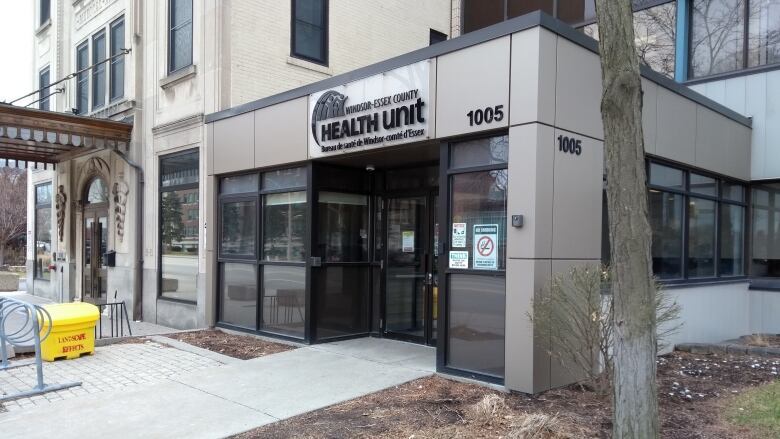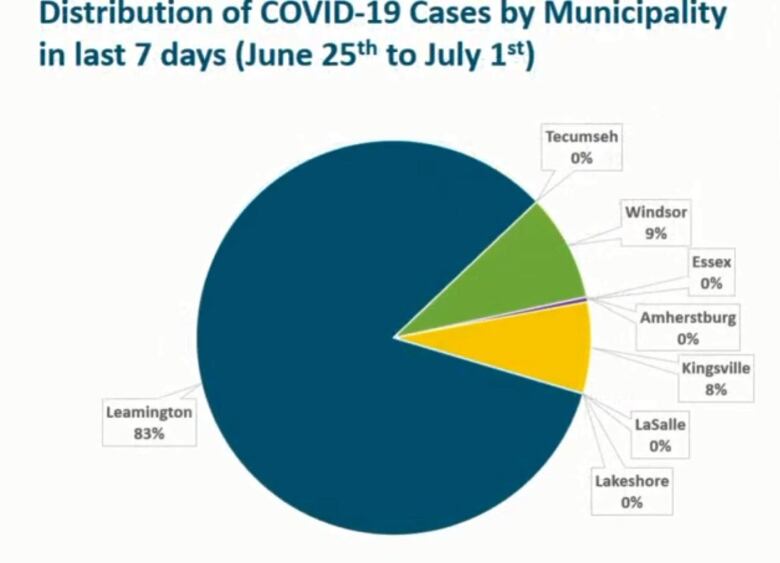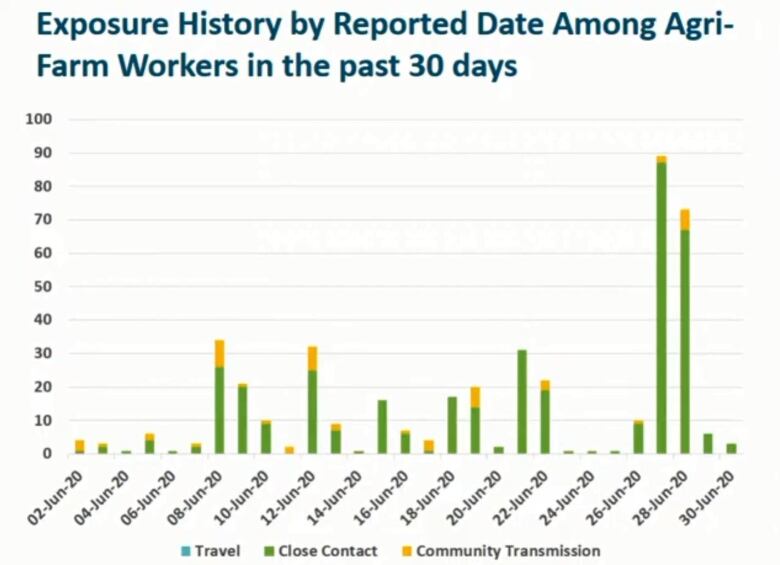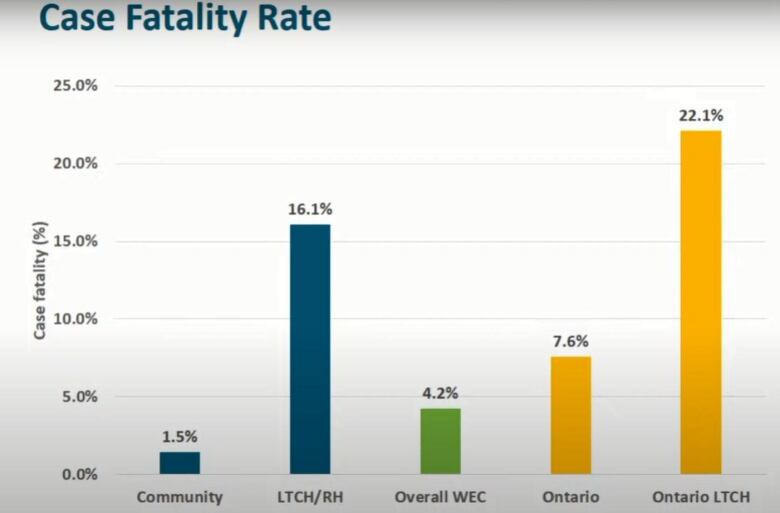CBC Windsor July 3 COVID-19 update: Region has 3rd-highest rate in Ontario again
1 agri-farm case, 2 community-based, 4 still under investigation

The Windsor-Essex County Health Unit (WECHU) announced on Friday seven new confirmed cases of COVID-19 in the region.
One case is in the agri-farm sector, two are community-based and four are still under investigation.
Of the 1,621 cases of COVID-19 in Windsor-Essex confirmed to date, 971 have been resolved and 544 cases are currently self-isolating.
A total of 68 people have died to date. Forty nine deaths have occurred in long-term care or retirement homes.
There are currently two such facilities experiencing an active outbreak: Devonshire Retirement Residence in Windsor and Extendicare Tecumseh.
There are four agricultural workplaces experiencing an outbreak. Two are in Kingsville and two are in Leamington.
Epidemiological summary
Starting off the health unit's weekly epidemiological summary report, Windsor-Essex County Health unit medical officer of health Dr. Wajid Ahmed pointed out that spikes in the charts are a result of a significant number of agri-farm workers testing positive for COVID-19 in late June.
Ahmed also used the recent spike in the region's agri-farm sector to explain why Windsor-Essex has the third-highest regional rate of COVID-19 in Ontario moving from the 4th-place position reported Friday, June 26.
Cases in the agri-farm sector currently represent 43 per cent of all confirmed COVID-19 cases in Windsor-Essex.
Ahmed said the timeline for the number of positive tests reported within 24 and 48 hours has also "improved significantly."
"We can see more recently, all these cases that are coming to us, investigations started in a timely manner, within 24 and 48 hours of receiving the results of these individuals," he said.
WATCH |WECHU's July 3 daily COVID-19 briefing:
In terms of distribution by sex, Ahmed said the health unit has noticed more cases in males than females. Approximately 62 per cent of overall cases of COVID-19 are within males, while 37 per cent are within females.
In terms of COVID-19 death breakdowns by sex, the majority of deaths were in female patients. Female COVID-19 deaths represent 60 per cent of all COVID-19 deaths in region.
According to the health unit's numbers, Leamington had the highest distribution of COVID-19 between June 2 and July, representing 62 per cent of the region's confirmed cases. Kingsville had the second-most cases, representing 26 per cent of Windsor-Essex confirmed COVID-19 cases.
Cases in Windsor represented 10 per cent of the region's total between June 2 and July 1.
Over the past week, between June 25 and July 1, Leamington has accounted for 83 per cent of the region's overall numbers.
Windsor represented nine per cent, while Kingsville accounted for eight per cent of the region's overall case count.
A majority of the region, Ahmed said, reported no new cases. Tecumseh, Essex, Amherstburg, LaSalle and Lakeshore all reported 0 per cent of new cases in the past week.

Between June 25 and July 1, agri-farm workers accounted for 84 per cent of all COVID-19 cases, while health-care workers represented two per cent.
Moving on to exposure history, Ahmed pointed out that early on in the pandemic, the majority of cases made their way to Windsor-Essex through travel.
Now, however, COVID-19 acquired through close contact and community transmission account for the largest chunk.
In terms of agri-farm worker exposure over the past 30 days, Ahmed said the majority of cases are being spread through close contact.
COVID-19 cases by health-care worker population skews largely to local workers.
Approximately 77 per cent of COVID-19 cases in the region's health-care workers are among local workers, whereas 23 per cent of cases worked in Michigan and were diagnosed in Ontario.
All of the cases in Windsor-Essex, the health unit reported that 73 per cent of cases had no or unknown underlying conditions, while 27 per cent had some form of chronic, underlying or immunocompromised condition.

Cough is the most common symptom of COVID-19 in Windsor-Essex, showing up in 55 per cent of confirmed COVID-19 cases.
Fever came in second, being present in 42 per cent of cases, while malaise came in third, showing up in 40 per cent of cases.
Ahmed said the region's health-care system capacity is currently below the essential threshold of 85 per cent.
"This signals that we are currently able to meet the demands related to COVID-19 if it increases in our community," he said.
As of July 3, 56.3 per cent of cases have been resolved, 36.9 per cent are self-isolating, 4.2 per cent have died.
The region's case fatality rate of 4.2 per cent is also less than Ontario's 7.6 per cent average.
The region's case fatality rate among long-term care and retirement homes 16.1 per cent is also lower than the provincial long-term care and retirement home fatality rate of 22.1 per cent.

Ahmed said the region is well past the point of seeing a doubling of cases every six days, adding that Windsor-Essex is now seeing a "significant flattening of the curve since the beginning of this pandemic."
In Windsor-Essex, COVID-19 has an R0 value of 1.17, meaning one case of COVID-19 results in 1.17 new infections every time it's passed along to a new host.
"When the R0 is greater than one, each existing infection causes more than one new infection," Ahmed said.
He accounted the region's R0 value to an increase of cases in the agri-farm sector.
Sources confirm Essex County farm effectively shut down is Nature Fresh in Leamington
Sources who spoke with CBC News have confirmed that Nature Fresh Farms in Leamington is the facility currently under stricts orders by the region's health unit to isolate employees and cease work until further notice.
Chris Ramsaroop with Justice for Migrant Workers and Santiago Escobar, national representative for the United Food and Commercial Workers union, both cited Nature Fresh employees.
"My understanding is that [it's] Nature Fresh," Santiago said.
In an email statement, a health unit spokesperson explained they don't "confirm the name or location of any workplace in COVID-19 outbreak unless there is a public health risk to the community."
The health unit's Wednesday decision to issue a new Section 22 order under the Health Protection and Promotion Act, effectively shutting down an Essex County farm now identified by sources as Nature Fresh has generated commentary from people ranging from local leaders all the way to Ontario Premier Doug Ford himself.
COVID-19 in Sarnia-Lambton
As of July 2, a total of 285 people in Sarnia-Lambton have tested positive for COVID-19, with 257 of those cases having been deemed resolved.
A total of 25 people have died since COVID-19 reached Sarnia-Lambton.
There are currently no active outbreaks in the region.
COVID-19 in Chatham-Kent
As of July 2, a total of 158 people in Chatham-Kent have tested positive for COVID-19, with 156 of those cases having recovered.
A total of one person has died since COVID-19 touched Chatham-Kent, and one person is currently self-isolating.
There are currently zero active institutional or workplace outbreaks.













_(720p).jpg)


 OFFICIAL HD MUSIC VIDEO.jpg)
.jpg)



























































































